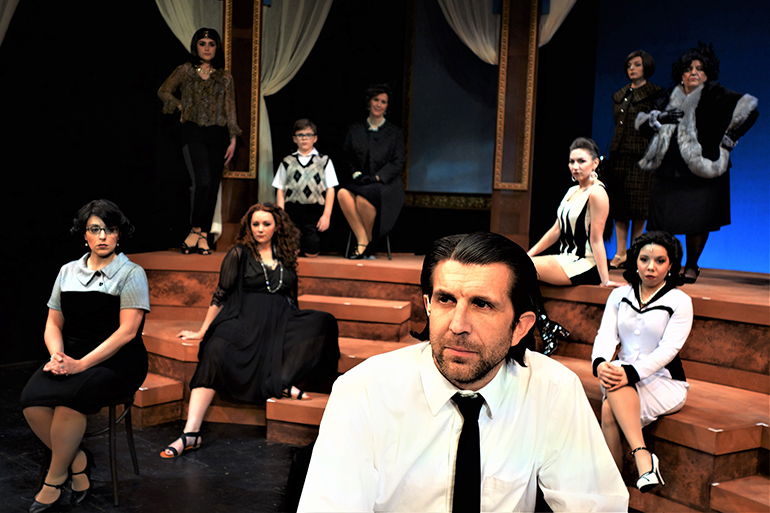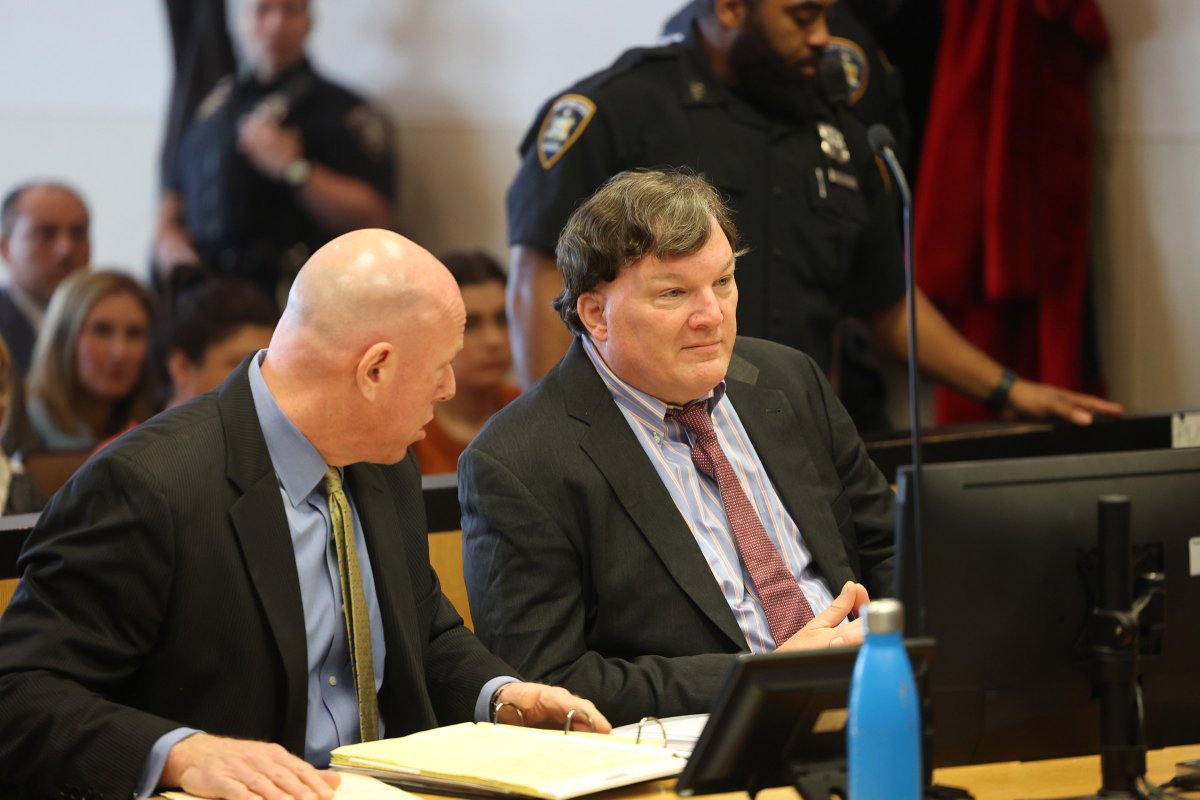Play Review: 'Nine – The Musical' Adapts Fellini at Theatre Three

We are a composite of all those who enter and exit our lives, leaving in their wake profound impressions. At mid-life, we may reflect on the purpose each played in creating the person we have become. Such are the potent thoughts that once-celebrated Italian film director and central character of Nine, Guido Contini, struggles with in Theatre Three‘s new production of the classic musical, now playing in Port Jefferson.
Contini has just turned 40, is suffering from severe writer’s block for a film his producer is pressuring him to begin shooting, and is at a turning point in his 20-year marriage to former film star Luisa del Forno, who is threatening to leave him if he doesn’t pay more attention to her. Additional pressures come from his mistress and his leading lady. In an effort to please his wife and gain some clarity for his creative process, Contini suggests they escape to a spa in Venice. Once there, he retreats into his nine-year-old self, taking refuge in his former innocence, freedom from responsibility, and the safety of his mother’s arms.
Nine, with book by Arthur Kopit, is the musical adaptation of filmmaker Federico Fellini’s iconic, semi-autobiographical 1963 movie 8 ½, titled in recognition of his prior body of work, including six full-length films, two short films, and one film he co-directed. Maury Yeston, who wrote the music and lyrics for Nine, adds another half-credit to Fellini’s output, explaining that if you add music to 8 ½, “it’s like half a number more.”

The musical surrounds Contini (Brian Gill) with an entire cast of women and one little boy—his nine-year-old self. This may seem like every man’s dream, but the tangled web these strong, empowered women spin around Contini have him gasping for a way out. Requiring a charismatic, passionate actor, Raul Julia played Contini in the original 1982 Broadway production, and Antonio Banderas took up the mantle in the 2003 revival. For his Contini, Gill skillfully maneuvers through a labyrinth of emotions, topping them off with a rich tenor voice.
The array of skilled actresses in Nine intoxicate with their stage presence and impress with gorgeous vocals that soar through Yeston’s hypnotic musical score.
Producer Liliane La Fleur (Debbie D’Amore) is a standout in this cast. Her comedic timing mixed with menacing turns is a joyride to behold. She struts her stuff through the show-stopping musical number “Folies Bergeres,” clearly proving herself as a consummate entertainer.
Christina Muens as Contini’s long-suffering wife begs for our sympathy, and we are on her side. In “My Husband Makes Movies,” Luisa laments the sacrifices she has made in this marriage to ensure her husband’s career would flourish. It’s a heart-wrenching look at the price she has paid for love.

The filmmaker’s mistress, Carla Albanese (Abigail McCabe), arrives in Venice distraught because Contini left without notifying her. Dazzling in a flesh-colored minidress, her every move is reminiscent of a Marilyn Monroe as Carla sensually gyrates through “A Call from the Vatican.” McCabe conveys an enticing yet wanting figure.
Contini’s hallucinations bring him back to his childhood and the two contrasting women in his life: his loving yet highly moralistic mother, adroitly played by Linda May; and Sarraghina (Stephanie Moreau), the gypsy who introduced him to sensuality as a young lad. May captivates with her stunning soprano in the show’s titular song, “Nine,” as she delivers an austere maternal portrayal, reprimanding her nine-year-old son (Brayden E. Bratti) for visiting the town gypsy. Bratti, for one so young, has exceptional stage presence and a sweet singing voice. And Moreau’s prostitute with a heart of gold sizzles in a tambourine dance that sends the message, “Dance today like it may be your last.”
As an adult, Contini finally gets a dose of inspiration when his muse and actress in his most highly acclaimed films, Claudia Nardi (TracyLynn Conner) comes to the Venice spa. He assumes she came to be with him, but she blurts out that his wife invited her. In a climactic moment, Contini takes his Luisa’s eyeglasses and puts them on Claudia, representing his intention to portray his wife in the movie through his muse. Luisa, horrified that her private life will be displayed on film, explodes in the song, “Be on Your Own.” She shouts, “Go to hell! Be on your way, I set you free!” But without Luisa, Contini is far from free, and this builds to the final crisis.
In the present climate of the Me Too Movement, Nine director Jeff Sanzel sensitively depicts the powerful women in charismatic genius Contini’s life, and not just as trinkets and trophies of a lascivious Casanova. Sanzel acknowledges the importance of women as mothers, sisters, teachers, temptresses, judges, wives, mistresses and muses.
Ronald Green III assembles elegant costumes that float with the actresses as they ascend and descend the staircase, a centerpiece of Randall Parsons’ set. Composed of arching backdrop, columns and the stairs, his scenery creates a majestic impression. Meanwhile, lighting by Robert W. Henderson, Jr. navigates the audience through the present and into Contini’s reveries, making both more palpable.
The orchestra, under the direction of Jeffrey Hoffman, adeptly weaves Yeston’s rich score, highlighting Contini’s real and imagined worlds.
Nine won five Tony Awards, including Best Musical, in 1982, while the 2003 revival earned two Tonys, including Best Revival of a Musical. See Theatre Three’s excellent take on this award-winning show in Port Jefferson (412 Main Street) through March 23, 2019.
Learn more at theatrethree.com or call the box office at 631-928-9100.
Barbara Anne Kirshner is the author of Madison Weatherbee-The Different Dachshund, a children’s book and musical. She is a regular contributor to DansPapers.com.



